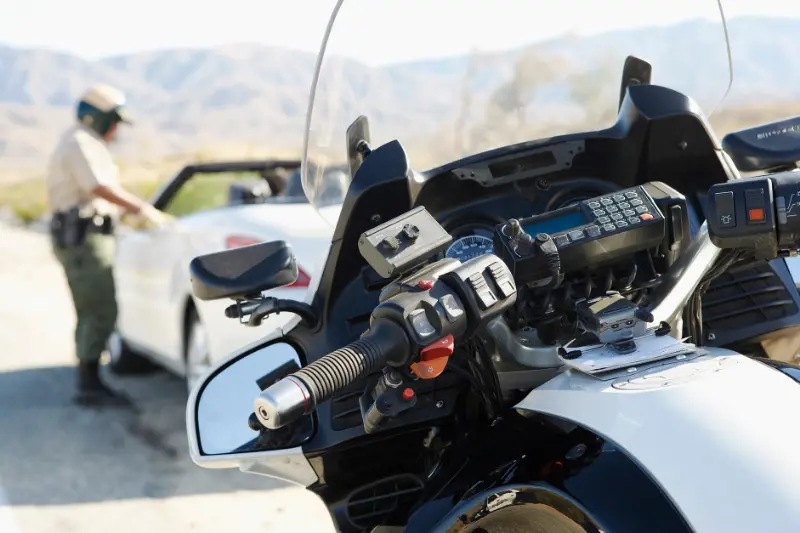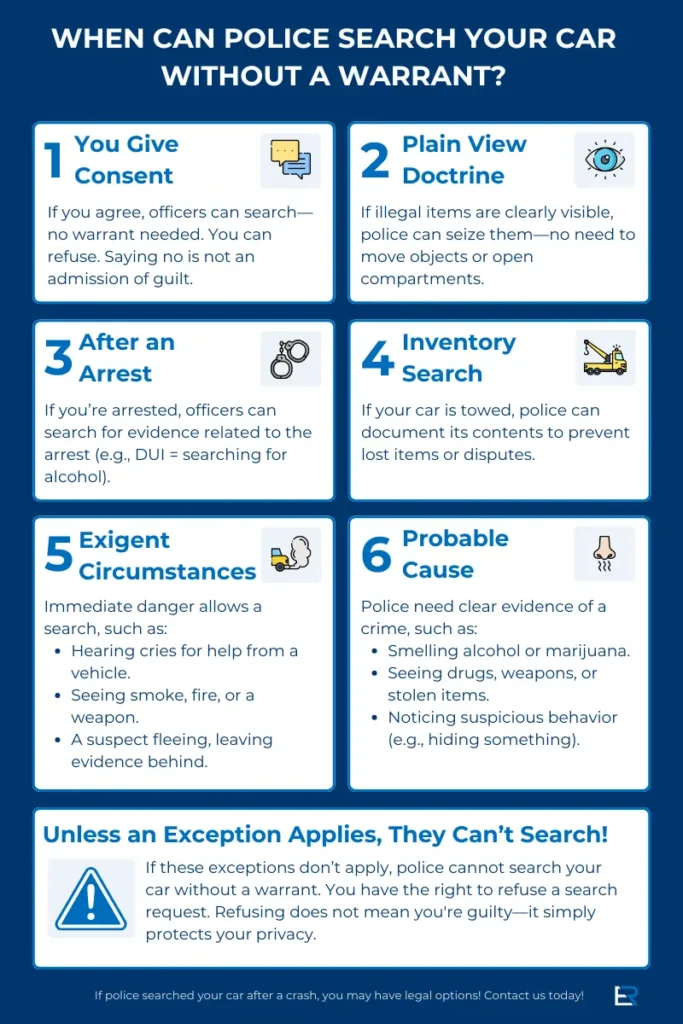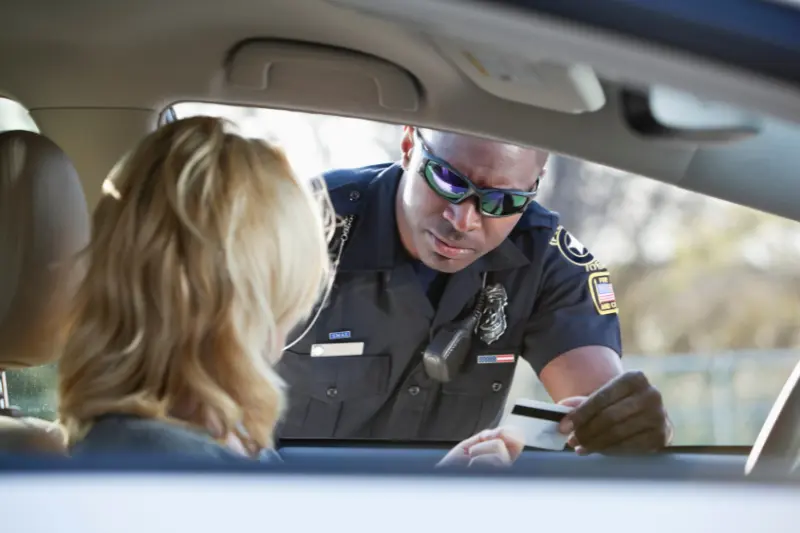It’s a common misconception that police can search any vehicle involved in an accident. In reality, the law isn’t that simple. Sometimes, officers need a warrant. Other times, they don’t. Knowing when a search is legal—and when it’s not—can help protect your rights if you ever find yourself in this situation.
When Can Police Search Your Car Without a Warrant?

In most cases, police need a warrant to search your vehicle. However, certain circumstances allow for exceptions. Here are common situations when police can legally search your car without a warrant after a car accident.
1. You Give Consent
If you agree to a search, police do not need a warrant. Officers often ask casually, such as, “Do you mind if I take a look inside?” Many people feel pressured to comply, but you can refuse. Refusing a search is not an admission of guilt—it simply protects your privacy.
For example, you are involved in a minor accident, and while waiting for a tow truck, an officer asks if they can check your glove compartment. If you say yes, anything they find—such as an unregistered firearm or illegal drugs—can be used against you. If you politely decline, they cannot search unless they have another legal justification.
2. Probable Cause
Police can search your car if they have probable cause—a reasonable belief, based on facts, that evidence of a crime is inside. This means they must have clear evidence rather than just suspicion.
Examples of probable cause:
- Smelling alcohol or marijuana coming from the vehicle.
- Spotting drugs, firearms, or stolen property without searching for them.
- Observing slurred speech, nervous behavior, or an attempt to hide something under the seat.
- The vehicle is evidence of a crime (e.g., a stolen vehicle or a getaway car).
Let’s say you are in a fender bender, and when the officer approaches, they smell marijuana and see a half-smoked joint in the center console. Because this is clear evidence of illegal activity, they have probable cause to search your car for more drugs.
3. Search After an Arrest
If you are arrested, police can search your vehicle for evidence related to the arrest. However, they cannot search the entire vehicle unless a separate legal justification applies.
Examples:
- If you’re arrested for DUI, officers can check for open alcohol containers or drugs.
- If you’re arrested for a weapons offense, police can search for illegal firearms or ammunition.
For instance, you crash into a stop sign, and officers suspect you’re driving under the influence. After failing a field sobriety test, they arrest you. At this point, they can search your car for liquor bottles, drugs, or anything that supports the DUI charge—but they cannot start searching unrelated areas unless another legal reason applies.
4. Exigent Circumstances
Police can search your car without a warrant if there’s an immediate danger or a risk of evidence being destroyed.
Examples of exigent circumstances:
- Police hear cries for help coming from inside a vehicle.
- An officer sees smoke or fire from a car, suggesting illegal activity.
- Someone flees the scene, leaving behind a suspicious vehicle full of potential evidence.
Let’s suppose you’re involved in a multi-car accident, and one of the vehicles catches fire. The police may search nearby vehicles immediately if they suspect flammable material, weapons, or a trapped individual needing assistance. Because time is critical, they do not need a warrant to act.
5. Inventory Search
If your car is towed after an accident, police can conduct an inventory search before it’s placed in an impound lot. This process safeguards your belongings and prevents disputes over lost or stolen items.
Examples of when an inventory search happens:
- If your car is undrivable and the police arrange to have it towed.
- You are placed under arrest, and as a result, your car is impounded.
Let’s say, your car is towed because it’s undrivable after an accident. During the inventory search, police find a bag of illegal drugs under your seat. Even though they weren’t actively searching for evidence, the drugs are now part of a criminal case against you.
6. Plain View Doctrine
The Plain View Doctrine allows police officers to seize evidence without a warrant if it is visible and they are lawfully present at the scene. However, officers cannot move objects or open compartments to search for additional evidence.
For the Plain View Doctrine to apply:
- The officer must be lawfully present at the scene.
- The item’s illegal nature must be obvious.
- The officer must have a legal right to access the item.
Examples:
- A gun is lying on the passenger seat in violation of firearm laws.
- A bag containing illegal drugs is visible on the dashboard.
- A purse reported as stolen, containing the owner’s ID, is visible in the backseat.
As an example, you are pulled over for running a red light. As the officer approaches, they see a bag of stolen electronics in your backseat. Since the items are visible, the officer can seize them without a warrant.
While this doctrine allows officers to seize obvious evidence, it does not permit further searches without legal justification. If evidence was seized improperly from your car accident, consult with our attorney to protect your rights.
When Do Police Need a Warrant?
If none of the above exceptions apply, police must obtain a warrant before searching your vehicle. This means they need authorization from a judge, typically supported by probable cause. If officers search your car without a warrant and no exception applies, the search may be illegal, and any evidence found could be challenged in court.

What to Do If Police Ask to Search Your Car After an Accident
After a car accident, police officers may request to search your vehicle. While some drivers feel pressured to comply, know that you have rights. You are often not required to consent to a search unless the officer has probable cause, a warrant, or another legal justification.
Here’s what you can do if police ask to search your car after an accident:
- Be calm and courteous: If an officer asks for permission, you are legally allowed to say no unless they have a legal justification.
- Ask if you must comply: If they do not have probable cause, a warrant, or another exception, you can decline.
- Do not resist if they proceed with the search: If an officer ignores your refusal and conducts a search, avoid confrontation. Instead, take mental notes and consult an attorney.
- Request a copy of the police report. This may document the reason for the search, which can be important if you challenge its legality later.
If you refuse a search, remember that police officers cannot legally proceed unless they have probable cause, a warrant, or another legal justification. However, they may attempt to pressure you into consent or imply that they are authorized to search without cause.
Refusing a police search does not imply guilt or fault in a car accident claim. Insurance companies cannot use your refusal as evidence that you were responsible for the crash. However, if police uncover evidence against you through other legal means, such as probable cause or an inventory search, it could impact your case.
What Happens if Police Conduct an Illegal Search After an Accident?

If police search your car illegally, their actions may violate your rights. Any evidence obtained unlawfully may be challenged in an attorney or other legal proceedings.
Here’s what to do:
- Stay calm and do not resist. Arguing or resisting could lead to additional charges.
- Document everything. Collect the officers’ names, badge numbers, and any statements about the search.
- Avoid accepting fault. Anything you say can be used against you.
- Contact an attorney immediately. A lawyer can determine if your case or other legal rights were affected.
If an illegal search led to evidence being used against you, your car accident attorney may be able to suppress the evidence, meaning it cannot be used in court.
How an Illegal Search Can Affect a Personal Injury Claim
An illegal search can have serious consequences for car accident victims, potentially damaging their case and reducing their ability to recover compensation.
If police find illegal items during the search, the insurance company may try to deny or reduce your claim. However, a car accident attorney can help demonstrate that the substance was unrelated to the collision, preventing insurers from unfairly using it against you.
If the police conduct an illegal search but find no evidence, it shouldn’t impact your personal injury claim. However, any unlawful search is a violation of your rights. If you have been subjected to an illegal car search, contact our car accident lawyers today to protect your case.
How a Car Accident Attorney Can Help You After an Accident and an Illegal Search
If you were injured in a car accident and police conducted an illegal search, you need a lawyer who understands both personal injury law and your constitutional rights. An unlawful search could impact your claim, credibility, and ability to recover compensation.
A personal injury lawyer can:
- Review the police report to identify any rights violations or inaccuracies that could affect your case.
- Challenge illegally obtained evidence to prevent it from being used against you in your personal injury claim or lawsuit.
- Negotiate with insurance to ensure your injuries, medical expenses, and pain and suffering are fully documented and accounted for in your settlement.
- Protect your rights if an illegal search leads to unfair treatment by insurance companies or law enforcement.
- Hold the at-fault party accountable and help you file a personal injury claim for compensation.
Injured in a Car Accident? Get Legal Representation Today

If you were injured in a car accident, you deserve justice and fair compensation—not additional legal complications. If police searched your vehicle without proper justification, it could impact your car accident claim and your ability to recover the damages you’re owed. At El Dabe Ritter Trial Lawyers, we fight to protect the rights of injured accident victims and ensure you get the maximum compensation possible.
Disclaimer: The information provided in this blog post is not intended as legal advice and should not be relied upon as such. You should consult with an experienced attorney for advice on your specific situation.

